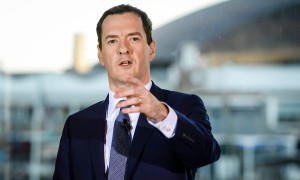The most dangerous cocktail is the chancellor’s own recipe
Dangerous cocktails were in evidence in many a bar during the Christmas and New Year holidays. I do not know how many the chancellor might have sampled, but his demeanour appears to have been transformed from one of blatant complacency in his autumn statement to pre-budget nerves. He now warns of “a dangerous cocktail of new threats” and, yes, “creeping complacency” in the British economic and political debate.
This is not, of course, anything to do with him and the complacency he was fostering as recently as before Christmas. No, this is mainly because of threats to the global economic recovery emanating from a manifest slowdown in China and the impact the collapse of oil prices is having on the economies and finances of oil-producing nations – with the obvious exception of the oil-producing country known as the United States, whose “fracking” boom has made no small contribution to oversupply and falling prices in energy markets.
It must be emphasised, however, that the oil price collapse, while affecting potential new investment in the North Sea, has had a largely beneficent impact on real incomes and consumer demand in nations such as Britain and other members of the EU. (Yes, we are still in it – just.) Indeed, it has offset to an appreciable extent the twin squeezes on economic demand of low wage rises and the austerity programmes favoured by Osborne and much of the eurozone.
Faced apparently with downward revisions to economic forecasts made as recently as November and December, what does the chancellor do? Does he consider for one moment that perhaps he should rescind the austerity programme that aims at a budget surplus on current and capital account within a few years?
No, on the contrary: he warns of “the beginning of the decline” of Britain unless the cuts to vital services continue. Moreover he unashamedly boasts to John Humphrys on the Today programme of conducting “the most sustained squeeze on public spending for 100 years”.
Subheading goes here: I love subheads
The chutzpah of this chancellor knows few bounds. He managed to tell a straight lie to his interviewer when the subject came up of the prime minister’s about-turn on his instructions to cabinet ministers regarding campaigning in the forthcoming EU referendum.
And the cuts continue despite the flood (pun intended) of evidence that they are shortsighted and counterproductive, after the pattern of false economies generally. Way back in 2004 my old friend Sir David King, then chief scientific adviser to the Blair government, warned that, as a consequence of global warming, “we must either invest more in sustainable approaches to flood and coastal management or learn to live with increased flooding.” In come David Cameron and George Osborne in 2010 to cut back on the budget for flood management, with the result that the floodgates open on the so-called “northern powerhouse”.
Subheads are the best oh yes they are
The thing about this government is that in so many key areas it is such a sham. The real problem facing the British economy continues to be its overseas trade deficit, not the budget deficit. Why, even the Financial Times, which, with the honourable exception of certain columnists, has been far too supportive of the cuts agenda, recently published a fascinating item about the obsession with the budget deficit.
In a survey of more than 100 “economic thinkers”, the FT found that nearly half the respondents were concerned about the chancellor’s dependence on household consumption to fuel the recovery, with the resulting trade and current account deficit, but “one concern was notable by its absence”. The FT went on: “Just three respondents cited the fiscal deficit as a big worry.” Repeat: just three, even though it has been the overriding obsession of the chancellor, a largely supportive press and, I regret to say, many BBC interviewers.
To its credit, the opposition has tried to hit back. Unfortunately to all intents and purposes it might as well have been firing blanks, because almost all the media coverage of the Labour party has been focused on the divisions within its ranks.
One is reminded of the context in which the Conservative prime minister Harold Macmillan made his famous remark all those years ago when asked what he feared most. The part of his reply that has become a cliche is “events, dear boy, events”. The part often forgotten is the first bit: “The opposition of events… ” This was a crack at the weakness of the official parliamentary opposition, then led by Hugh Gaitskell. Then as now, Labour was riven by dissent over policy towards the nuclear deterrent. Plus ça change. Events are worrying Cameron and Osborne, but the opposition is not.
Oh dear: the poor old Labour party. Desperately needed, but opening all its flanks to its enemies. It is sad, indeed tragic, that the opposition has become a laughing stock when the real laughing stock should be a government whose chancellor tells us after five-and-a-half years of unnecessary and counterproductive austerity: “Anyone who thinks it’s mission accomplished with the British economy is making a great mistake.”
Yes, the mission is more of the same, with the severe risk of exit from the European Union thrown in.
